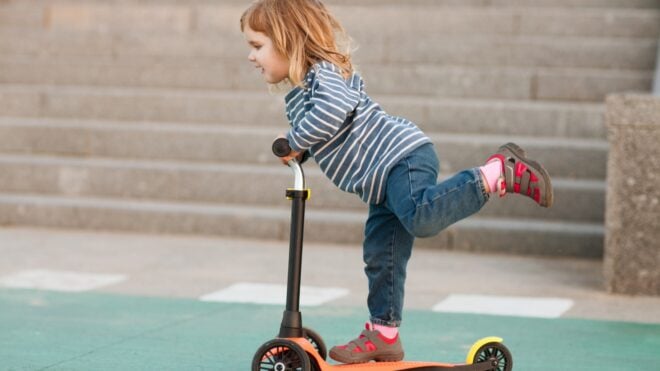The funny thing about raising kids is that the memories you buried decades ago come crashing in the moment a familiar scene unfolds. Year after year, I cringe and resist the urge to comment when parents leave screaming babies, toddlers and preschoolers on the laps of hired Santas for the sake of a photo op.
My heart nearly drops out of my chest each time I witness such a scene because I remember that feeling of dread in the pit of my stomach. My parents never forced me to sit on Santa’s lap, but I remember one visit with Santa when I stood three feet away, frozen in fear and glaring at him. He seemed big and imposing. Although I’m sure he was friendly and good with kids, in my young mind I was sure that he was bad news.
Stranger danger alert in Santa’s workshop!
The other night I was flooded with emotions as I watched a mom step back from a sobbing baby. His arms reached for her and his face was bright red with tears and panic as his preschool age sister looked on with worry. For what seemed like an eternity, the mom attempted to get a smile out of him. Pick him up! Pick him up! Please, pick him up. My silent requests went unanswered for a solid minute, before she gave up on the picture and moved on.
I know what you’re thinking: The baby won’t remember any of that. You’re probably right. But you know who will? That worried looking big sister who never did make a request from Santa because she was too busy watching her brother fall apart right in front of her eyes.
RELATED: The Emotional Needs of Toddlers
I know it seems like these holiday mishaps are no big deal, but to the child sobbing on the lap of a stranger — or the older sibling looking on in horror — these seemingly small moments can feel very big. When parents laugh throughout the whole ordeal? Well, that only adds to the confusion and frustration for the kids.
Still not convinced? Check out these four reasons to skip the bad Santa photos this year.
1. It’s traumatizing.
Fears of both strangers and adults dressed in costumes are common among the toddler and preschool-age groups. It’s the same reason they don’t actually want to meet Mickey Mouse when you finally get to Disneyland. It might seem like a good idea in the safety of the home, but out in the world, that large man dressed in red with an enormous beard can be downright scary.
Andrea Nair, M.A., CCC, psychotherapist and parenting expert, agrees. “The thing is that ‘Santa Trauma’ is a real phenomenon,” says Nair. “Some children get so affected by their visit to Santa that they get nightmares or develop aversions toward men with beards or glasses. Some don’t want to read books about Santa or even go in a mall,” cautions Nair. “Although we may giggle at their cute little upset faces, we really should respect the big feelings that are terrifying them.”
2. Loss of trust
Our children trust and love us unconditionally, particularly during those very early years. They look to us to help them when they’re scared, frustrated or sad. They feel helpless in the face of big scary emotions, and they run to us for comfort and security.
What feels like a quick, funny interaction to you might actually break that trust and impact the bond you’ve worked so hard to establish. So, I guess the important question to ask yourself is whether you think it’s really worth it.
3. The worry cycle
Some kids are more prone to worrying than others. Some happily jump on the laps of any Santa they see, while others run for cover. Some go bed with ease and transition without a care, while others seek a long bedtime routine and need frequent warnings to cope with transitions.
Temperament is an important but often overlooked piece of the puzzle, when it comes to parenting young children. What works for one child, and what worked for you, won’t necessarily work for every child. And that little worrier? That child needs a lot of extra care when it comes to these potentially worrisome events.
Forcing the Santa shot upon a little worrier will only exacerbate the worry cycle. It’s scary enough to confront a fear of strangers in costumes. But when your parent ignores your emotions that just makes the future worries grow in size.
4. You can’t get it back.
I see the photos in my Facebook feed. They pop up on shows like Ellen DeGeneres and Jimmy Kimmel. I know those pictures might seem funny to many at the end of a long day, but I never laugh. I can’t help but think about the sobbing child overwhelmed with emotion. What’s worse than that actual moment of pure panic that can lead to a lifetime of mistrust? Parents looking for a cheap laugh on social media or 15 seconds of fame on a TV show. It’s bad enough that kids go through this each year, but once you put it out there for the public? You can’t ever get it back.
Fast forward 15 years…how do you think your child will feel when that image comes up in a Google search? Do you think she’ll laugh or do you think she’ll be completely humiliated? I suppose that brings us back to temperament.
RELATED: How Traumatic Events Affect Child Development
We can’t predict the future, but we can respect our children right now and practice unconditional love every single day. Even if it means no Santa photo this year.




